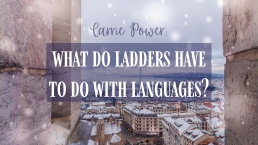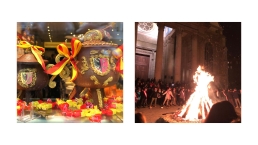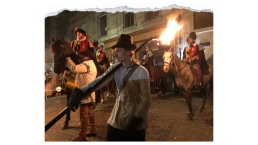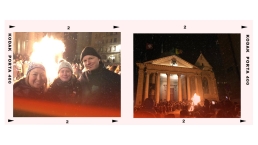
The night of the 11th – 12th of December 2022 marked 420 years since a historic battle between *Protestants and *Catholics in Geneva.
To celebrate the Genevoises (people from Geneva) defeating the Catholic soldiers, a yearly festival called ‘La Fête de L’Escalade’ takes place with a weekend full of events across the city.
At dusk, on a bitterly cold Sunday afternoon, I watched just some of the activities that celebrate one of Geneva’s oldest traditions.
There was a *procession organised by the city’s historical *re-enactment group with men, women, and children led by groups of drummers and *flautists.

People paraded on horseback or on foot, wearing historical costumes. They proudly carried flags with the *coat of arms of Geneva, fire-lit torches, *muskets, and ladders.
Although a ladder may sound strange, the festival name ‘L’Escalade’ comes from the French verb d’escalader (to climb), and the ladder represents the attacking troops who used ladders to climb the city walls.
Throughout the city centre, there were lots of stalls selling mulled wine (‘vin chaud’ in French and ‘Glühwein’ in German), roasted chestnuts (‘marrons chauds’ in French and ‘geröstete Kastanien’ in German), and bread with a special type of melted cheese called ‘raclette’ drizzled on top.
Keeping with the theme of food, all the supermarkets in Geneva sell a *cauldron (‘une marmite’ in French, ‘ein Kessel’ in German) made of chocolate which celebrates the moment a brave Genevoise cook called Catherine Cheynel threw a boiling cauldron of soup over one of the attackers! The cauldron represents the *resistance and the courage of the Genevoises.

The parade itself wound its way through the packed streets and lanterns were handed out to children.
The procession finished outside the cathedral where the choir sang ‘Cé qu’é lainô’ (He who is high), the hymn of Geneva in the local *dialect called Arpitan, which sounds a lot like the British national anthem ‘God Save the Queen/ King’.
The hymn, composed after the battle, has 68 verses and tells the story of L’Escalade and the victory of the Genevoises over the Savoyards (the Catholic troops of the *Duke of Savoy).
A bonfire was lit outside the cathedral where a large crowd formed. It was here that I met Alma and Mathias, a married couple who live in Geneva.

Together, we watched young men with red and white *sashes, joining hands and forming a circle around the bonfire to sing the Picoulet, a folk song dating back to the Middle Ages. It is well known around French-speaking Switzerland and sung during festivals. The Picoulet is a fun song, where a group of men stand in a circle dancing and singing about different parts of the body, like fingers, hands, and elbows…it was a great way to keep them warm during the festival!
Whilst in Geneva, it has been really lovely to have the chance to see such an important local festival which offers lots of fun for all the family.
Vocabulary
Protestants – people who follow Protestant churches, who broke away from the Catholic church in the Middle Ages (from the late 5th century to the late 15th century)
Catholics – people who follow the Catholic faith and are led by the Pope
procession – a parade or march
re-enactment – acting out an event from the past
flautists – people who play the flute
coat of arms – a design used on items such as shield and flags
muskets – a type of gun, fired from the shoulder
cauldron – a large metal pot for cooking over an open fire
resistance – to refuse to accept or go along with something
dialect – a type of language that is specific to a region or group of people
Duke of Savoy – Charles Emmanuel I was the leader of the Duchy of Savoy which used to be a country in Western Europe
Sash – a long strip of material worn over one shoulder or around your waist
Link to Cé qu’è lainô – YouTube which sings 3 of the 68 verses of the hymn of Geneva.
Link to Lyrics of Cé qu’è lainô | Ville de Genève – Site officiel (geneve.ch) in Arpitan and English.
Link to Cortège de l’escalade avec le “Le Picoulet” – YouTube from 2015. The song starts at 5 mins.
Link to La Fête de L’Escalade website (in French): Accueil – Compagnie de 1602
Cauldron photo credit: https://cuisinehelvetica.com
